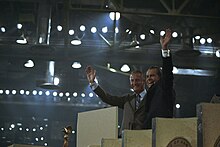| Committee for Nixon | |
|---|---|
 | |
| Campaign | 1972 Republican primaries 1972 U.S. presidential election |
| Candidate | Richard Nixon 37th President of the United States (1969–1974) Spiro Agnew 39th Vice President of the United States (1969–1973) |
| Affiliation | Republican Party |
| Status | Announced: January 7, 1972 Official nominee: August 23, 1972 Won election: November 7, 1972 Inaugurated: January 20, 1973 |
| Slogan | President Nixon. Now more than ever |
The 1972 presidential campaign of Richard Nixon was a successful re-election campaign for President Richard Nixon and Vice President Spiro Agnew. President Nixon authorized the formation of his 1972 reelection campaign committee, Nixon-Agnew '72, on January 7, 1972.[citation needed] On August 23, 1972, he secured the nomination of the Republican Party at its convention in Miami Beach, Florida.[citation needed] The convention nominated Vice President Agnew as his running mate.[citation needed]
In the November 7, 1972 general election, President Nixon carried 49 of 50 states, winning the election with 520 electoral votes. Nixon's opponent, Democratic Party nominee, George McGovern, carried only Massachusetts, and the District of Columbia, receiving 17 electoral votes.[citation needed] President Nixon won 60.7 percent of the popular vote and McGovern received 37.5 percent.[citation needed] Nixon's reelection as President was confirmed by the Electoral College on December 18, 1972,[citation needed] and certified by the Joint session of Congress of January 6, 1973.[citation needed]
Both Agnew and Nixon resigned within two years of their second term. In December 1973, Gerald Ford replaced Agnew as vice president and in the following year, replaced Nixon as president. This made Nixon the first and, as of 2024, only person to be inaugurated four times as both president and vice president.
